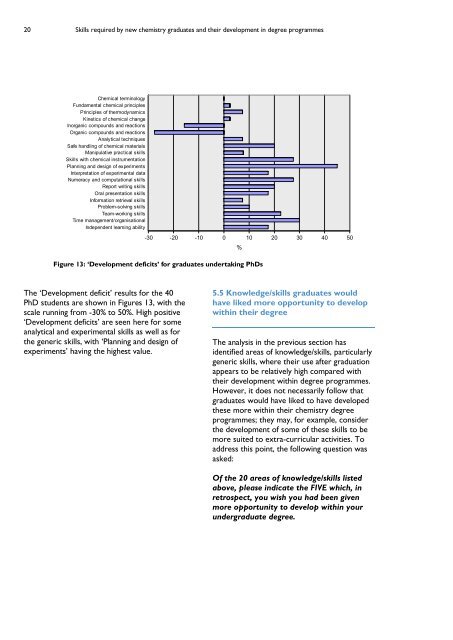Skills required by new chemistry graduates - Higher Education ...
Skills required by new chemistry graduates - Higher Education ...
Skills required by new chemistry graduates - Higher Education ...
You also want an ePaper? Increase the reach of your titles
YUMPU automatically turns print PDFs into web optimized ePapers that Google loves.
20 <strong>Skills</strong> <strong>required</strong> <strong>by</strong> <strong>new</strong> <strong>chemistry</strong> <strong>graduates</strong> and their development in degree programmes<br />
Chemical terminology<br />
Fundamental chemical principles<br />
Principles of thermodynamics<br />
Kinetics of chemical change<br />
Inorganic compounds and reactions<br />
Organic compounds and reactions<br />
Analytical techniques<br />
Safe handling of chemical materials<br />
Manipulative practical skills<br />
<strong>Skills</strong> with chemical instrumentation<br />
Planning and design of experiments<br />
Interpretation of experimental data<br />
Numeracy and computational skills<br />
Report writing skills<br />
Oral presentation skills<br />
Information retrieval skills<br />
Problemsolving skills<br />
Teamworking skills<br />
Time management/organisational<br />
Independent learning ability<br />
30 20 10 0 10 20 30 40 50<br />
Figure 13: ‘Development deficits’ for <strong>graduates</strong> undertaking PhDs<br />
%<br />
The ‘Development deficit’ results for the 40<br />
PhD students are shown in Figures 13, with the<br />
scale running from -30% to 50%. High positive<br />
‘Development deficits’ are seen here for some<br />
analytical and experimental skills as well as for<br />
the generic skills, with ‘Planning and design of<br />
experiments’ having the highest value.<br />
5.5 Knowledge/skills <strong>graduates</strong> would<br />
have liked more opportunity to develop<br />
within their degree<br />
The analysis in the previous section has<br />
identified areas of knowledge/skills, particularly<br />
generic skills, where their use after graduation<br />
appears to be relatively high compared with<br />
their development within degree programmes.<br />
However, it does not necessarily follow that<br />
<strong>graduates</strong> would have liked to have developed<br />
these more within their <strong>chemistry</strong> degree<br />
programmes; they may, for example, consider<br />
the development of some of these skills to be<br />
more suited to extra-curricular activities. To<br />
address this point, the following question was<br />
asked:<br />
Of the 20 areas of knowledge/skills listed<br />
above, please indicate the FIVE which, in<br />
retrospect, you wish you had been given<br />
more opportunity to develop within your<br />
undergraduate degree.
















